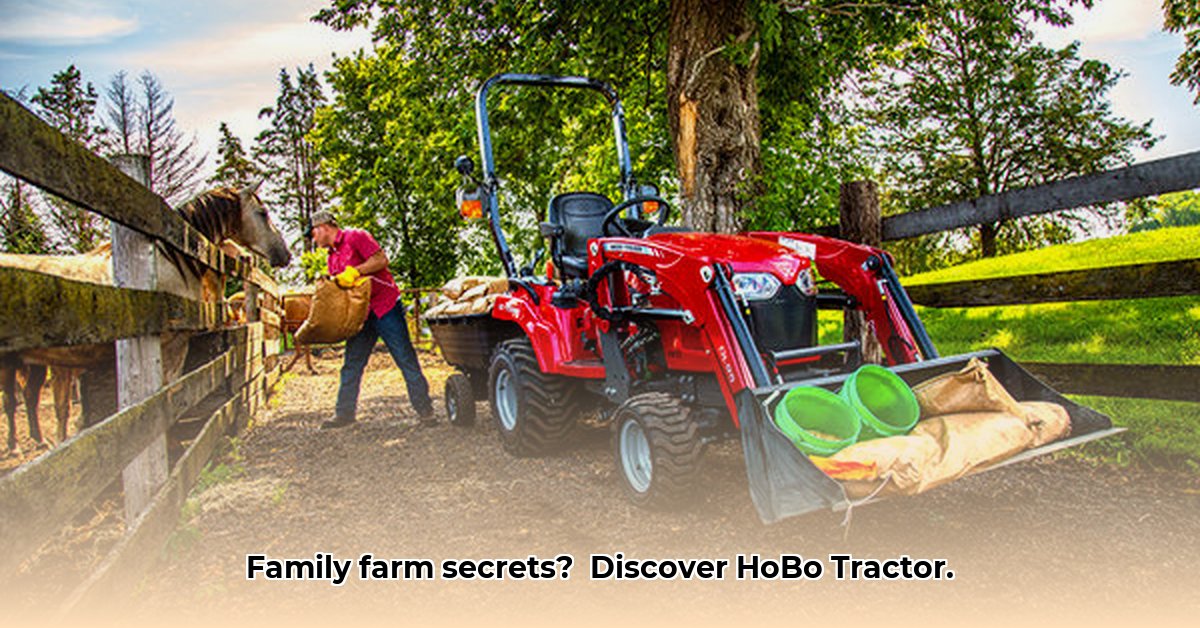
HoBo Tractor: Your Local Farm Equipment Experts
HoBo Tractor stands out as a family-owned farm equipment dealership committed to personalized service and competitive pricing. They've carved a niche by supporting farmers of all scales—from small-plot owners to larger operations—in adopting sustainable agricultural practices. Their deep understanding of the challenges faced by these farmers allows them to offer tailored solutions. This approach extends beyond simple transactions; it’s about building lasting relationships and fostering a thriving local farming community.
Their partnership with Massey Ferguson provides access to a diverse range of tractors, ensuring a suitable fit for various farm sizes and needs. Whether you require a compact tractor for a smaller property or a more powerful model for extensive acreage, HoBo Tractor offers a precise solution for your operational requirements.
More Than Just a Sale: Support That Extends Beyond the Transaction
HoBo Tractor's dedication to customer success truly sets them apart. Their support extends far beyond the initial sale, fostering a true partnership throughout your farming journey. They offer assistance with farm setup, and their skilled mechanics provide rapid equipment repair services, minimizing downtime. Their focus on building long-term relationships creates trust and mutual understanding, reinforcing their position as valuable partners to their clientele.
Do you need assistance getting your farm operational? HoBo Tractor provides comprehensive support. Are you experiencing equipment malfunctions? Their skilled mechanics ensure swift repairs and minimal interruptions to your farming activities. They prioritize building trust and strong relationships with each customer.
Looking Ahead: Growth and Sustainability in the Agricultural Sector
The agility and personalized service inherent in a family-run business are significant advantages for HoBo Tractor, allowing them to provide a level of support often unavailable from larger corporations. However, navigating market changes requires strategic planning and adaptation.
How will HoBo Tractor maintain its success? Strategic partnerships, employee training investments, and potential expansion into related agricultural sectors appear crucial. Their commitment to community engagement and sustainable practices will undoubtedly be instrumental in their continued growth within the evolving agricultural landscape. Isn't this proactive strategy key to their long-term success in a competitive market? The answer is a resounding yes. HoBo Tractor's commitment to community and sustainability is a key differentiating factor.
Practical Steps for Success: Actionable Advice for Stakeholders
Let's outline concrete actions various stakeholders can take to maximize their engagement with HoBo Tractor:
For HoBo Tractor Owners/Management:
- Short-Term: Enhance online visibility through a robust website and social media presence. Actively solicit customer feedback to refine services.
- Long-Term: Collaborate with organizations promoting sustainable agriculture to unlock new opportunities. Invest in employee training programs to maintain a skilled workforce. Consider business expansion or diversification.
For Local Farmers & Landowners:
- Short-Term: Assess equipment needs meticulously. Utilize HoBo Tractor's repair services for optimal equipment maintenance. Explore their financing options.
- Long-Term: Participate in HoBo Tractor's workshops and training sessions. Implement sustainable farming practices, such as precision agriculture, to improve efficiency and profitability.
For Massey Ferguson:
- Short-Term: Strengthen the partnership with HoBo Tractor, providing sales and marketing support.
- Long-Term: Develop sustainable farming equipment tailored to smaller farms. Collaborate with HoBo Tractor to enhance customer service strategies.
For the Sustainable Agriculture Sector:
- Short-Term: Leverage HoBo Tractor's services fully. Support family-owned businesses, vital to local food systems.
- Long-Term: Advocate for policies supporting small, family-owned farms. Promote research and development of sustainable farming equipment.
Navigating Potential Risks: A Proactive Approach
Like any business, HoBo Tractor faces potential risks. Understanding these challenges is essential for long-term viability.
| Risk Category | Probability | Impact | Mitigation Strategy |
|---|---|---|---|
| Economic Downturn | Moderately High | Very High | Diversify customer base; build strong financial reserves; explore alternative revenue streams |
| Competition from Larger Dealers | Moderately High | Moderate | Showcase superior customer service; focus on specialized niches; build brand loyalty |
| Equipment Malfunctions/Repairs | Low | Moderate | Invest in preventative maintenance programs; offer efficient and reliable repair services |
| Supply Chain Disruptions | Moderately High | Very High | Develop strong relationships with multiple suppliers; explore alternative supply routes |
| Regulatory Changes | Low | Moderate | Stay informed on regulations; maintain compliance; proactively adapt to changes |
Choosing the Best Sustainable Farming Equipment for Small Farms
Selecting the right equipment is crucial for small farms, impacting both profitability and environmental sustainability. Let's simplify the process:
Assessing Your Needs: A Foundation for Success
Before equipment selection, thoroughly assess your specific needs. This includes crop type, soil composition, and budget. Starting small with essential tools is a wise investment strategy. Prioritize efficiency and sustainability; look for tools that minimize soil disturbance and water consumption.
Prioritizing Essential Equipment: Focusing on Fundamentals
Identify your most crucial equipment needs. Avoid unnecessary gadgets; focus on fundamental tools. For example, reliable soil preparation tools are essential. Develop a well-defined budget to avoid overspending.
Exploring Sustainable Options: Minimizing Your Environmental Footprint
Sustainable farming equipment extends beyond fuel efficiency. Consider the entire lifecycle—from responsible manufacturing to ease of repair and recycling. Investigate tools made from recycled materials or those with a long lifespan. This approach minimizes environmental impact and long-term costs.
Budget-Conscious Choices: Strategies for Maximizing Value
Farming equipment is an investment. Buying used equipment can reduce costs, but thorough inspection is vital. Investing in durable, well-maintained equipment, even if used, often proves more cost-effective. Spread out purchases to avoid financial strain.
Evaluating Equipment Lifespan and Repair Options: Ensuring Long-Term Value
Consider a machine's lifespan and the availability of local repair services. Easy-to-find parts minimize downtime and costs. Research thoroughly and consult with other farmers before committing to a significant purchase.
Key Takeaways:
- Start with a comprehensive needs assessment.
- Prioritize essential equipment.
- Explore sustainable options.
- Develop a realistic budget and spread out purchases.
- Research equipment lifespan and local repair options.